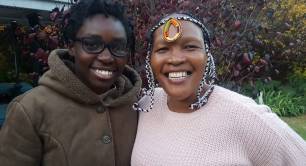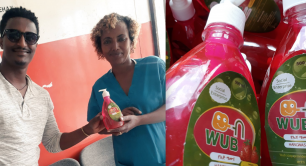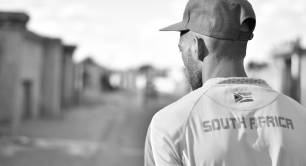From World Cup to world crisis, the South African venture that sides with local youth
South Africa’s SoulArt Foundation has created a community art centre and a safe space for youth in the heart of Soweto, by tapping into the power of waste and art. DICE Young Storymaker Imani Dlamini meets its founder to find out more – and discovers the coronavirus has prompted a new project.
The year is 2010 and South Africa is hosting the FIFA World Cup. It’s a big year: it is the first time an African country is hosting the sporting event, and over 300,000 tourists are flocking to the country for the sole purpose of attending the games, a major boost to the tourism sector.
2010 is also a big year for 21-year-old Sibusiso Mokhachane. That’s when he and a group of friends decide to turn a passion project into a business: creating canvases and art out of recycled materials such as newspapers that they would display on Vilakazi Street in Soweto, Johannesburg. This innovation was not just him being creative: it was a necessity as he couldn’t afford canvases so opted to make his own.
Vilakazi Street is known for once housing two Nobel Peace Prize winners: former President Nelson Mandela and Archbishop Desmond Tutu. Now it is a bustling tourist destination with attractions such as the Mandela House Museum, restaurants, and artworks and curio stalls. Mokhachane and his friends decided to take advantage of this opportunity by creating artwork and selling it to the tourists flocking in: it was a way to create jobs and a positive outlet for the city’s youth.
“It was a passion project. It was us identifying an opportunity, identifying a gap and filling that gap,” recalls Mokhachane.
That passion project later became SoulArt Foundation, a social enterprise and product design studio committed to youth and community development in Soweto. Working closely with a core group of seven full-time staff and a network of about 15 designers and artists, they manufacture items such as bags, luggage and furniture from recycled materials and textiles.
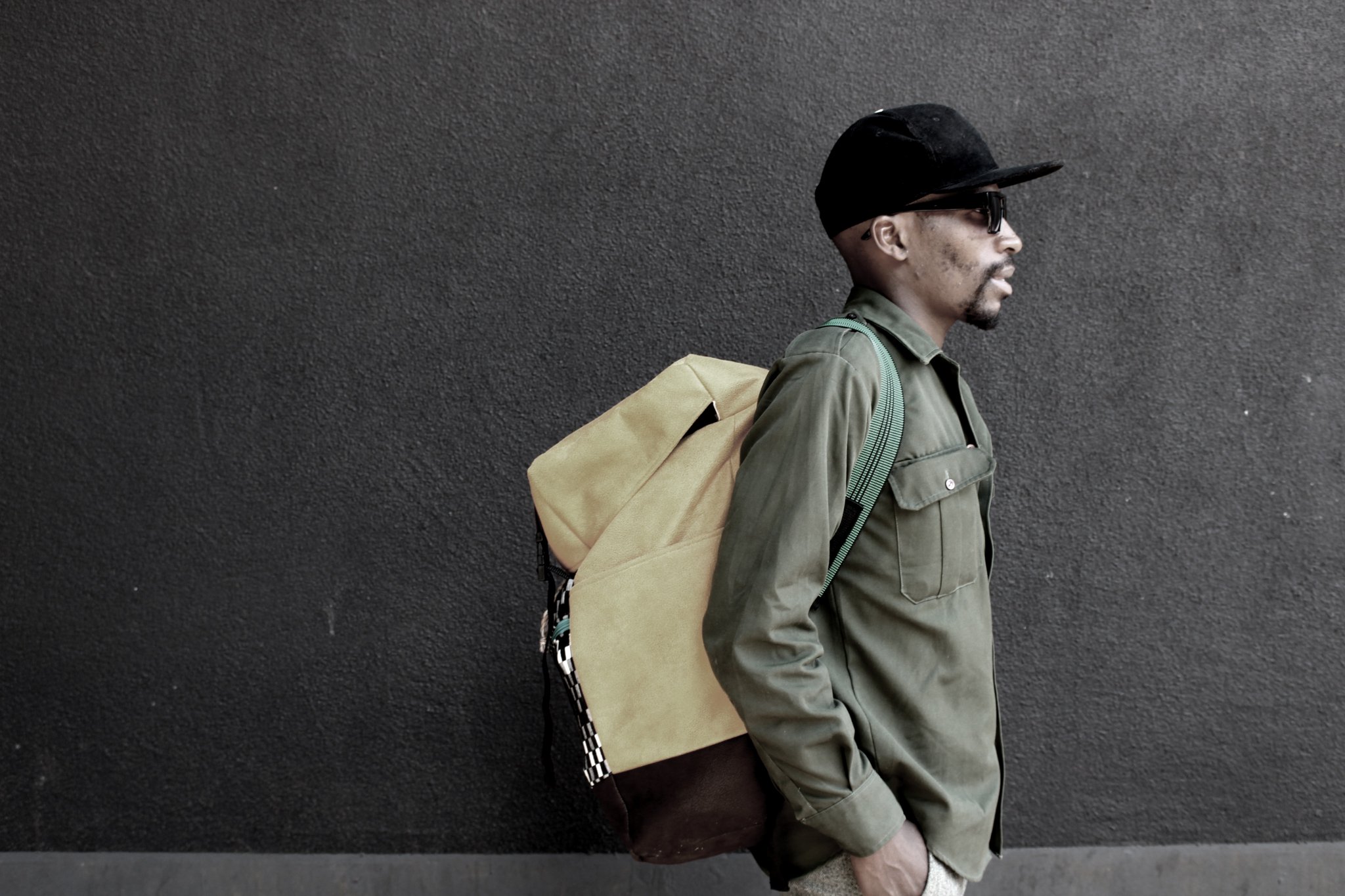
Above: Sibusiso Mokhachane, whose passion for art and entrepreneurial eye led to the creation of SoulArt Foundation ten years ago
Life in Soweto
SoulArt Foundation grew out of Mokhachane’s frustration with the social ills in his hometown of Soweto in southwest Johannesburg – the largest Black urban settlement in South Africa.
Soweto occupies an important space in South African history. It was created in the 1930s by the white government, at a time when racial segregation was policy – Black people had designated areas they could live.
As in many parts of the country, Soweto has pockets of wealth but also pockets of poverty, with high levels of unemployment and not many skills development opportunities. Growing up in the township, Mokhachane says he wanted “nothing to do with this” and was determined to leave as soon as he got the chance.
At the time he observed that many young people were turning to drugs to escape their harsh reality. That has not changed much since he was a teenager. As in many urban centres, drug abuse is rampant in Soweto. One of the most notorious drugs is Nyaope – a highly addictive street drug made from a combination of heroin, cannabis, antiretrovirals and other substances.
Mokhachane says youth turn to drugs for lack of a better option. “They don’t have alternative activities that can keep them occupied when they don’t have a job… they will try to escape that reality with drugs, alcohol, chasing young girls around.”
More than half of South Africa's young people are unemployed
South Africa’s unemployment rate currently sits at 29% – one of the highest in the world. It’s even worse among young people: more than half of 15-24-year-olds are unemployed, which creates serious challenges for a country that also grapples with high levels of poverty and inequality. Furthermore, 32% of that age group in South Africa are not in employment, education or training of any sort, according to latest figures.
Therefore, the vision behind SoulArt Foundation was to create a youth and community development centre dedicated to skills development and addressing the challenges young people face.
Mokhachane believes that those best-placed to address these issues are the youth themselves.
“We know exactly the challenges of young people. We know exactly what leads young people to substance abuse… to all the challenges that we are currently facing as a community. So we cannot all go around asking for help, we need to be the change that we need to see.”
From culture-inspired bags – to masks
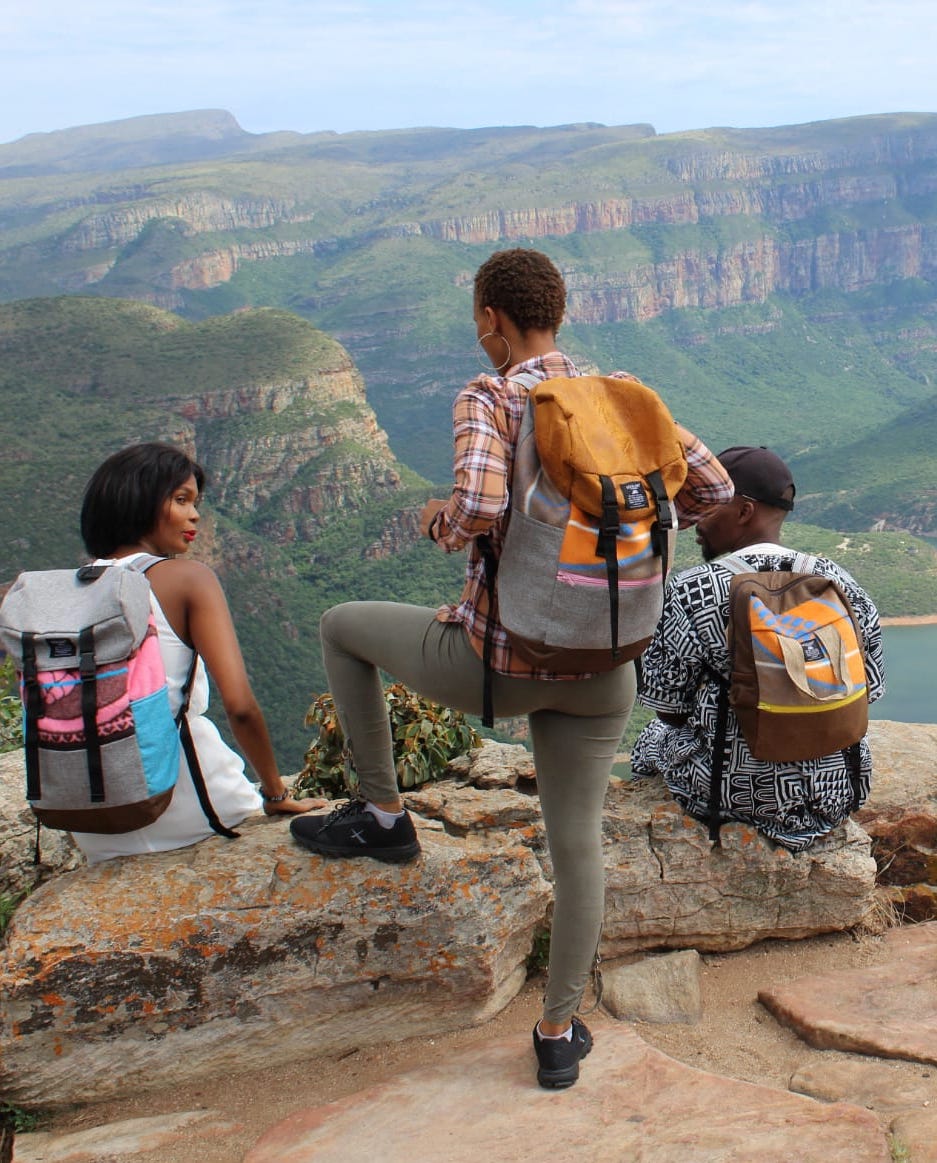 Today, SoulArt Foundation’s bags, luggage, notebooks and other items are sold mainly to corporates – and a portion of the profit is used to fund their community development projects, such as mentoring youth and teaching them skills such as sewing, silkscreen printing and weaving.
Today, SoulArt Foundation’s bags, luggage, notebooks and other items are sold mainly to corporates – and a portion of the profit is used to fund their community development projects, such as mentoring youth and teaching them skills such as sewing, silkscreen printing and weaving.
“I didn’t like the [non-profit or NGO] model of going to corporates and asking for money. Instead it’s what value can we offer them, what value can we give them in exchange for financial support,” he says.
And the designers benefit too. Mokhachane says one of the most gratifying parts of this work is witnessing someone go from being unemployed, to seeing them “find a purpose” as they register a company, open a business account, make a first sale and then “bring that money back home and support their own families”.
The SoulArt portfolio includes a range of backpacks made from traditional Sotho blankets that celebrate the rich cultural heritage of South Africa and challenge stereotypes held about the continent “through storytelling that celebrates Africa as royalty, that is, instead of glorifying struggle and poverty,” explains Mokhachane.
Materials are sourced from local upholstery firms or factories which provide off-cuts, and other ‘waste’ materials such as plastic, cardboard from dumping sites.
But right now, designers are busy making a different kind of product: re-useable face masks (pictured top) to help people protect themselves from the coronavirus pandemic gripping the world. These are made from fabric off-cuts, for low-income communities and organisations who need them, such as orphanages.
SoulArt Foundation is one of many social enterprises that are adapting and serving the current needs of society, as Pioneers Post hears when we speak with Mokhachane – over the phone, because South Africa is currently under lockdown.
“It won’t make sense to sell bags in this time,” he says. “We need to adapt to reality and to what’s going on and to also serve [the community] because that’s our “why”. That’s why we chose to be a social enterprise: to serve the society and the community.”
It won’t make sense to sell bags in this time. We need to adapt to reality and to serve the community because that’s our “why” - Sibusiso Mokhachane
Of course, as for many businesses, Covid-19 has brought challenges for cashflow. This has been mitigated by support the foundation has received from an incubator, The Box Shop, which supports emerging businesses with training, coaching, and help to access markets.
The pandemic has also affected the organisation’s production and capacity due to social distancing and lockdown of its suppliers, Mokhachane says. They have had to adjust how they work – including working remotely with their network of designers and makers.
By the end of May, South Africa had over 32,000 confirmed cases and over 680 people had lost their lives due to the virus. But for millions of people living in South Africa’s densely populated areas, it's still a challenge to follow preventative guidelines such as maintaining social distancing and wearing a mask in public, especially when balancing that with meeting the daily demands of survival. Many organisations cannot afford to buy all the masks needed for their workers or beneficiaries: “They would rather buy food,” explains Mokhachane.
So, SoulArt Foundation hopes to produce 20,000 masks: some of which will be sold to corporate clients, and some donated to organisations and people in need who could not otherwise afford them.
“We create them mostly from discarded materials, so it doesn’t cost a cent or costs very little to create them,” he explains.
A passionate artist
Mokhachane had both a “talent and passion” for art, even as a child. Although he did not receive formal art training, curiosity drove him to learn new skills and draw inspiration from magazines, YouTube and Google. His mom, a domestic worker, also played a role in his art education by bringing second-hand art supplies from her employer’s child.
However, his family discouraged him from studying art as it was considered an unstable career path. Instead he opted to study Tourism at the University of Johannesburg. It was an experience, however, that further shaped his journey in the arts.
Entrepreneurship is a journey. You need to be stubborn because reality will test you
“Tourism exposes you to so much… it opens your mind. It pushes you to think differently… Tourism showed me that art can be commercialised.”
Ten years after SoulArt Foundation was created, what is the founder’s advice for other would-be entrepreneurs?
“Entrepreneurship is a journey. You need to be stubborn because reality will test you,” he says.
But being flexible and open to collaboration can help too. “Some people are good at building relationships, [some with] numbers… When you mix all those people and you build a system and you share a vision, it’s a great thing.”
Imani Dlamini is a DICE Young Storymaker – one of 14 young journalists recruited by Pioneers Post and the British Council from six countries to report on social and creative enterprise.
All photo credits: SoulArt Foundation.



